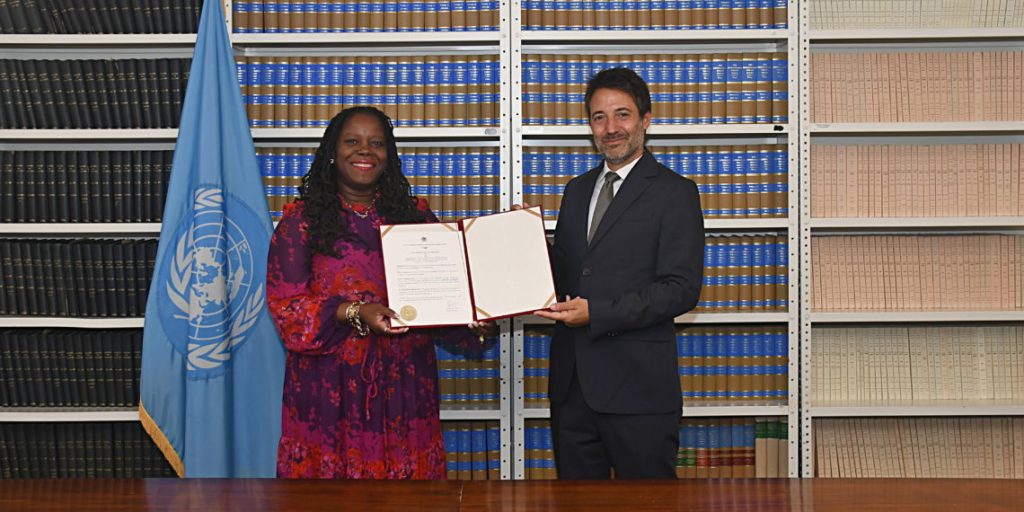St. Kitts and Nevis Ratifies Kigali Amendment, Reinforcing Commitment to Climate Change Mitigation
St. Kitts and Nevis has solidified its commitment to global climate action by ratifying the Kigali Amendment to the Montreal Protocol, a crucial international agreement aimed at phasing down hydrofluorocarbons (HFCs). This decision marks a significant step in the Federation’s ongoing efforts to mitigate the impacts of climate change and protect the environment for future generations. The Kigali Amendment, adopted in 2016, targets HFCs, potent greenhouse gases commonly used in refrigeration, air conditioning, and other applications. While initially developed as ozone-friendly alternatives to ozone-depleting substances, HFCs possess a significantly higher global warming potential than carbon dioxide, contributing to the escalating climate crisis. By ratifying the amendment, St. Kitts and Nevis joins the growing number of nations committed to reducing HFC emissions and curbing global temperature rise.
The ratification of the Kigali Amendment aligns with St. Kitts and Nevis’s broader sustainable development goals and its vulnerability to the adverse effects of climate change. As a small island developing state (SIDS), the Federation faces unique challenges, including rising sea levels, increased frequency and intensity of extreme weather events, and threats to its vital tourism and agriculture sectors. These vulnerabilities underscore the urgency and importance of actively participating in international climate agreements and implementing measures to mitigate climate change impacts. By committing to phasing down HFCs, St. Kitts and Nevis aims to contribute to global efforts to limit global warming to 1.5 degrees Celsius above pre-industrial levels, a target set by the Paris Agreement, and enhance its resilience against climate-related threats.
Implementing the Kigali Amendment presents both opportunities and challenges for St. Kitts and Nevis. The transition to HFC alternatives necessitates investments in new technologies, training for technicians, and public awareness campaigns to promote the adoption of climate-friendly cooling solutions. However, embracing these changes offers significant benefits, including reduced energy consumption, improved energy efficiency, and the creation of new economic opportunities in the green technology sector. Furthermore, phasing down HFCs can contribute to improving air quality and public health, enhancing the overall well-being of the population.
The Federation’s commitment to the Kigali Amendment will be operationalized through a phased approach, involving policy adjustments, technical support, and capacity building initiatives. Developing national regulations and standards for HFC management, strengthening customs controls to prevent illegal trade in HFCs, and providing incentives for the adoption of alternative technologies will form key components of the implementation strategy. Collaborations with international organizations, such as the United Nations Environment Programme (UNEP) and the Multilateral Fund for the Implementation of the Montreal Protocol, will provide essential technical and financial assistance, facilitating the smooth transition to HFC-free alternatives.
Beyond the immediate benefits of reducing HFC emissions, the ratification of the Kigali Amendment reinforces St. Kitts and Nevis’s leadership role in international climate diplomacy. As a vocal advocate for the rights and concerns of SIDS in global climate negotiations, the Federation’s commitment to the Kigali Amendment strengthens its credibility and influence on the global stage. By actively participating in and implementing international environmental agreements, St. Kitts and Nevis demonstrates its commitment to multilateralism and its determination to address the global climate crisis collaboratively.
The ratification of the Kigali Amendment represents a significant milestone in St. Kitts and Nevis’s journey towards a more sustainable and climate-resilient future. By phasing down HFCs, the Federation is not only contributing to global efforts to mitigate climate change but also safeguarding its own environment, economy, and public health. The commitment to the Kigali Amendment is a testament to St. Kitts and Nevis’s proactive approach to addressing the challenges of climate change and its dedication to building a more sustainable and resilient future for its citizens and the global community. The implementation process will require sustained efforts, collaboration, and innovation, but the long-term benefits of a cleaner, healthier, and more sustainable future will undoubtedly outweigh the challenges.
Share this content:












Post Comment